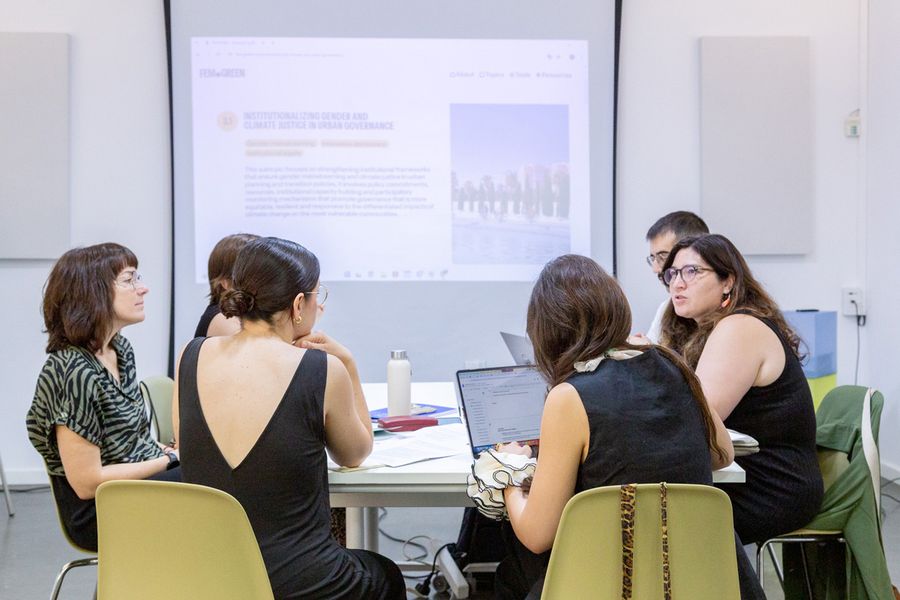Gender mainstreaming
Innovative democracy
Institutional equity
This subtopic focuses on strengthening institutional frameworks that ensure gender mainstreaming and climate justice in urban planning and transition policies. It involves policy commitments, resources, institutional capacity building and participatory monitoring mechanisms that promote governance that is more equitable, resilient and responsive to the differentiated impacts of climate change on the most vulnerable communities.

Adopt inclusive legal and regulatory frameworks that institutionalise gender equality and climate justice as a guiding principle. This includes reforming existing regulations and creating new laws that mandate an intersectional approach at all stages of the urban and climate policy cycle, from formulation to implementation and evaluation.
Design and implement mandatory fem.green-sensitive assessment processes. These assessments should be a standard part of all urban decision-making processes, considering differentiated impacts by gender, age, class, ethnicity and other variables, in order to reduce structural inequalities.
Establish participatory monitoring and evaluation systems with an intersectional approach. The systematic collection and use of data disaggregated by gender and other variables is key. These systems should include citizen follow-up mechanisms to ensure institutional transparency and accountability.
Strengthen institutional capacity through continuous training of public staff. Implement mandatory training programmes on gender, intersectionality and climate justice for all technical and political staff in local public administration. This contributes to transforming institutional culture from within.
Strengthen advocacy to integrate feminist perspective into urban and climate planning. Support social movements, feminist networks and community organisations to actively participate in defining institutional priorities. This implies opening formal channels for dialogue and direct influence on public policies.
Inclusive leadership
Feminist urban governance
Gender equity in decision-making
Grassroots urban activism
This sub-topic promotes equitable access to leadership and decision-making spaces in urban and climate transition contexts. It seeks to make visible and strengthen the role of women, LGBTQIA+ people and racialised communities, with a clear commitment to the redistribution of power. It incorporates the principle that the people and territories most affected by the climate crisis must be at the centre of political, technical and community leadership spaces.

Ensure the effective representation of women and dissidents in urban and climate planning processes. This implies establishing criteria for parity, meaningful participation and monitoring mechanisms that ensure inclusion beyond symbolic presence.
Remove structural barriers through affirmative action policies with an intersectional approach. Adopt measures such as inclusive quotas, historical correction mechanisms, and internal rules that address multiple discriminations based on gender, race, sexual orientation or migrant status.
Implement mentoring and training programmes for diverse leadership in urban and climate governance. Design strategies for training, mentoring and support networks for women, youth and non-normative people to access leadership roles with concrete tools.
Fund and strengthen feminist community leadership in urban climate justice. Allocate public funds and technical support to grassroots organisations led by women and dissidents that promote just, sustainable and locally-rooted solutions.
Review and transform institutional power dynamics. Promote power audits, more horizontal structures, and internal evaluation mechanisms that challenge patriarchal, racist or colonialist logics in urban governance.
Social innovation
Feminist urban governance
Community-led planning
Representation in policy-making
This subtopic proposes rethinking traditional models of institutional participation through feminist, care-centred and climate-sensitive methodologies. It recognises the importance of including historically marginalised voices in the planning of just and resilient cities, and positions participation as a transformative tool in the face of ecological and social crisis.

Apply intersectional participatory methodologies that recognise multiple forms of oppression (gender, class, race, disability, etc.) and climate vulnerability, ensuring meaningful inclusion.
Design horizontal participatory processes, with non-hierarchical structures that distribute power and promote co-responsibility in decision-making. Ensure access to informed processes that take into account the slow variables and impacts of climate change.
Establish active accessibility mechanisms (clear language, interpretation, careful schedules, safe spaces, etc.) so that all people can participate fully.
Recognise and redistribute care work, incorporating concrete supports such as childcare, time compensation, and times adapted to the reality of the participants, especially in processes linked to adaptation and resilience.
Ensure transparency and accountability at all stages of the process, including clear decision-making criteria and participatory evaluation mechanisms.
Focus processes on structural transformation, not just inclusion. The aim is to change who participates, how decisions are made and what priorities are put at the centre.
Nighttime justice
Safe spaces and mobility
Night workers rights
Inclusive nightlife
Addresses the night as a key urban space for gender and climate justice. This subtopic makes night inequalities visible and promotes policies that guarantee safety, mobility and rights for all people who live or work at night.

Address gender dynamics in night-time economies and policies, with attention to visibility, safety and climate vulnerability.
Design accessible, safe and functional night-time urban spaces for all gender identities.
Ensure equity in night-time transport, with safe and gender-sensitive services especially in sustainable modes of transport such as bike infrastructure and public transport.
Incorporate principles of sustainability in night-time planning, reducing environmental impacts and reinforcing inclusion.
Ensure the possibility of participation of night-time workers in public policy design processes.
This project has been funded with support from the European Commission. This website reflects the views only of the authors, and the Commission cannot be held responsible for any use which may be made of the information contained therein.